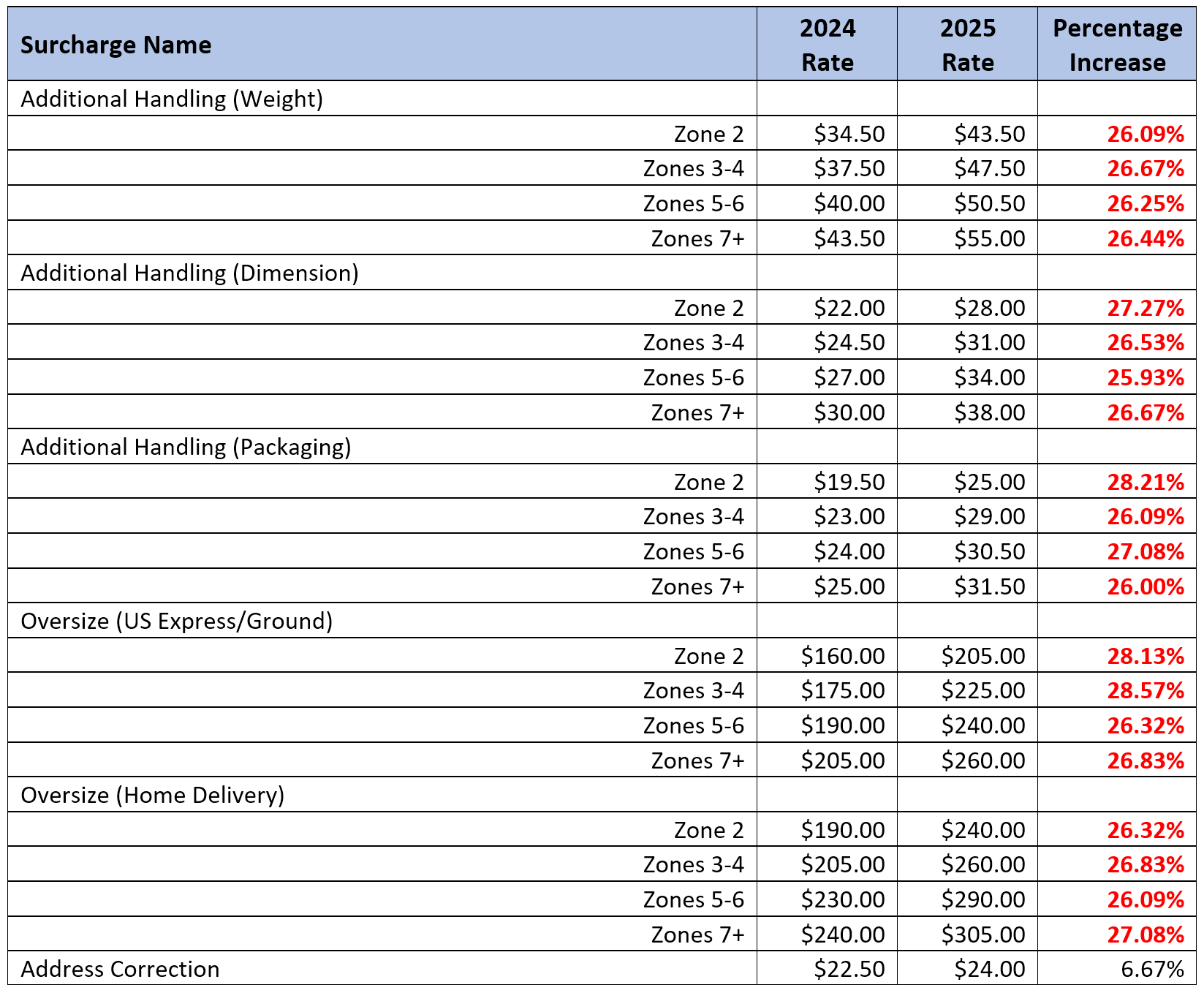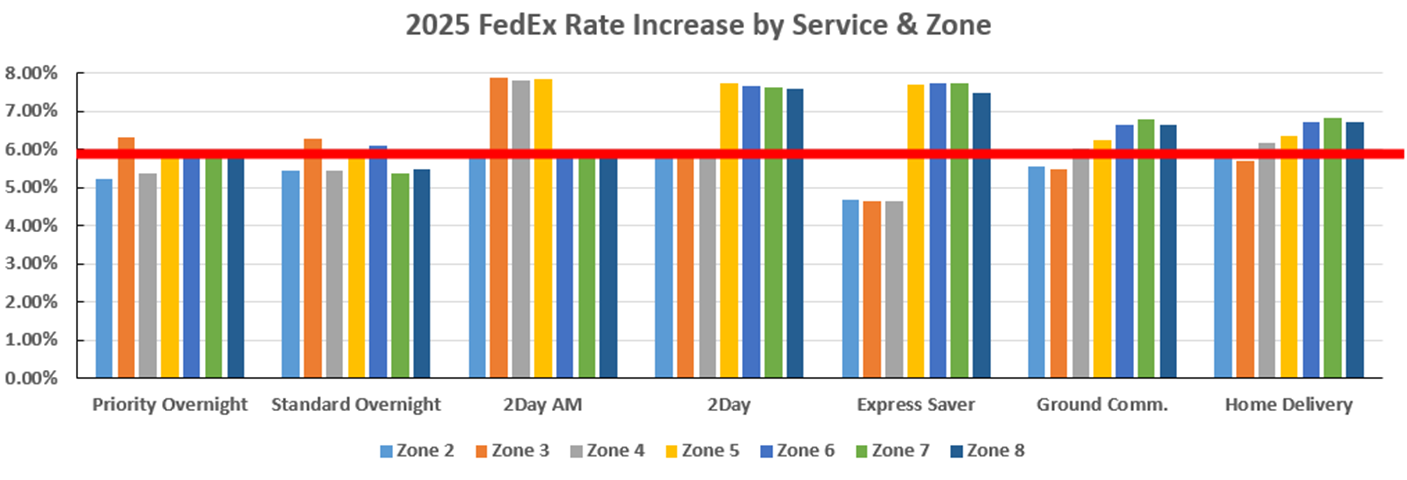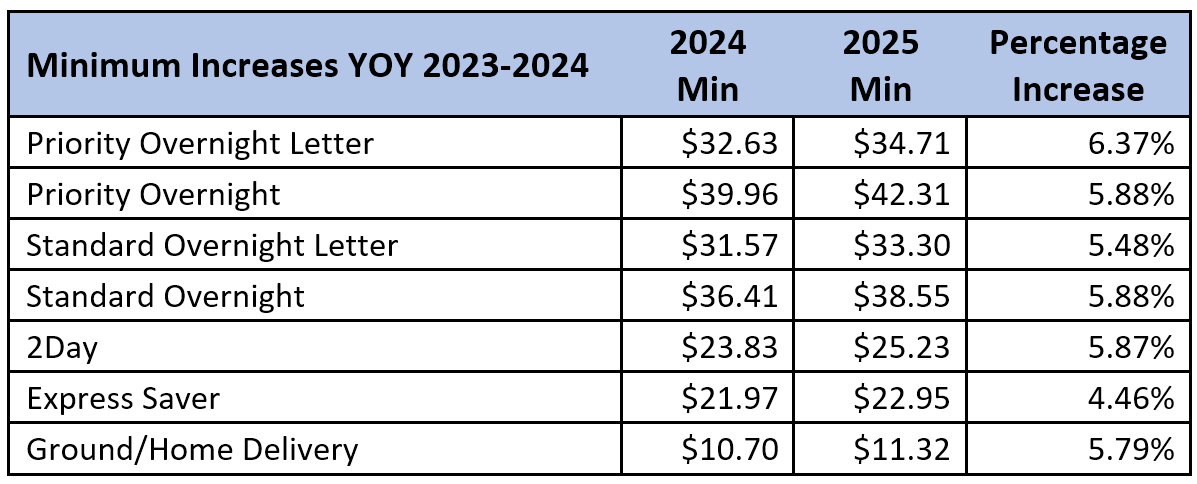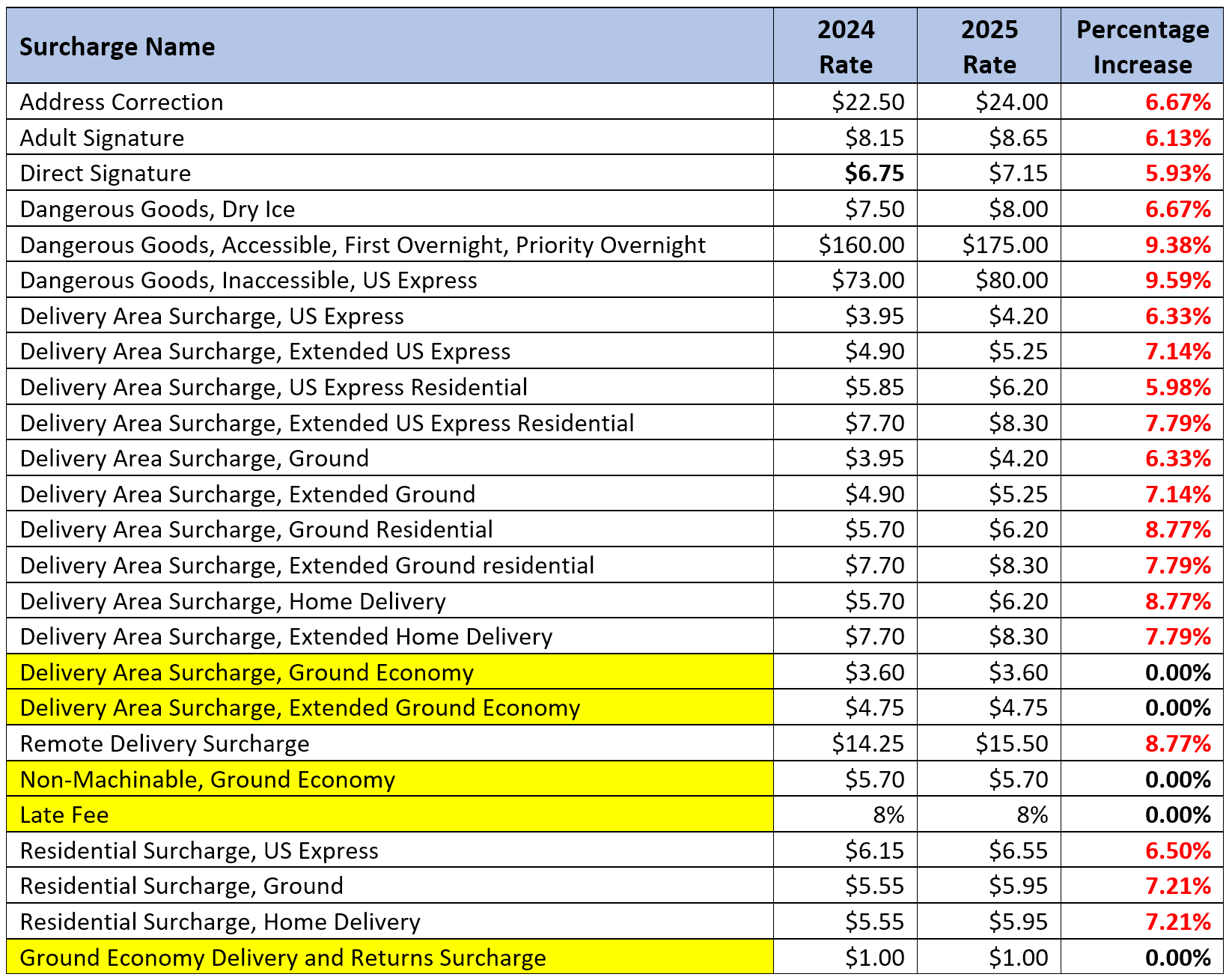FedEx has announced a 5.9% 2025 General Rate Increase (GRI) that will take effect on January 6, 2025.
UPS has not yet announced its General Rate Increase, but you can be sure that it will be coming soon and that there is a good chance they will mimic FedEx since, well, that’s what happens every year.
While the 5.9% is the same as last year, the first thing to keep in mind is that the General Rate Increase is an average. Depending on the service or services you use and other factors within that service (weight of the package and distance traveled), that rate increase can be above or below the average.
For example, we are seeing increases above 5.9% for both Ground Commercial and Home Delivery starting at zone 5 and above. Same thing on 2nd Day air. The shipments above zone 5 are getting hit hard. FedEx is going to charge you more for the distance your packages travel on these services.
There is a lot to digest, and the impact to any one shipper will differ significantly based on factors like whether your shipping is air or ground, commercial or residential, or large or small packages. Keeping that in mind, below are several items that stand out:
1. FedEx goes first
Like last year, FedEx has announced their rate increase before UPS. Traditionally, while there is some variance within their rate increases (typically as it relates to certain surcharges and when and how they apply), overall, both carriers tend to match the other.
FedEx throwing down the gauntlet first, sets the tone, but we don’t want to read too much into this. Someone had to be first.
If FedEx is your primary carrier their announcing first is obviously more relevant to you. If you are splitting volume or primarily with UPS, you’ll still want to pay attention to what FedEx has announced regarding how you may want to proceed in the future. Either way, we can expect UPS to announce soon based on precedent.
2. Bigger is definitely not better
Additional Handling and Oversize fees will increase by more than 26%. That continues a trend.
In the past, even if these fees went up, they were the same across all zones. Not anymore. The rates have increased significantly AND increase the farther your package travels. If you have big packages, you are going to be penalized, while those with smaller stuff will not.
FedEx sees an opportunity to make money and improve these packages’ margins. They know shippers have fewer options when it comes to bigger packages, and they are going to make you pay for it. That said, you are not without options. By doing this, FedEx is also sending you a signal to start a conversation with other carriers.
3. Increases higher on 2nd Day air services
As you can see in Chart 1, the rate increase for the next-day air services, Priority, and Standard Overnight, hews closely to the 5.9% average rate increase. Jump ahead to the 2nd Day Air AM and 2nd Day Air services and you see an average rate increase well above the line at all weights.
With greater emphasis on meeting a two-day delivery commitment that has been commonplace in the market, it seems FedEx thinks they can get shippers to pay more to get things delivered before the third day.
While many shippers will choose cheaper ground options for both commercial and residential deliveries, that is only available on shipments nearer to home, which can deliver within two days. After that, you need an air option. The Ground commercial rates at the lighter weights have increased LESS than the 5.9% average rate increase, though at 11 lbs.+, they exceed that average. There is more of an increase on Home Delivery, impacting residential shipments even more.
Most shippers trying to meet two-day targets try to use Ground options for both commercial and residential deliveries as a first choice. FedEx seems to have accounted for that with this increase as it relates to the distance traveled. They know when you can use ground and when you can’t.
The increases on 2nd Day AM jump out, but keep in mind that this is not a heavily utilized service. More importantly, we see the 2nd Day Air rates jump on Zones 5+. Same on the three-day Express Saver Service. So, if you are targeting two- or three-day delivery and need air options, you’ll pay more. If you are going to shy away from those deferred air options and stick with ground options, well, you’ll get hit with more of an increase at the higher zones.
4. Minimums are always an issue
We all understand what a rate increase means. One of the things that often gets lost in the shuffle is understanding the minimum price for FedEx services. Both FedEx and UPS put a floor price in place. So, even if you have great discounts, FedEx makes sure you will not pay less than the rates listed below in Table 2 for each of their services.
Only the Priority Letter rate exceeds the 5.9% GRI. Most of the rest are close, are either just a hair below, or well below it in the case of the Express Saver service. If you are trying to get better rates from FedEx and only ask for discounts, you may end up short-changing yourself.
A 100% discount on Priority Overnight Letters still means you’ll be paying $34.71 for that service in 2025.
And, of course, that doesn’t even include what you’ll be paying in the way of surcharges.
5. Don’t let the extremely high increases to AHS and Oversize overshadow increases to other surcharges
When you first hear that the GRI is 5.9%, most folks would assume that it applies across the board.
As mentioned, when applied to the service charges, it’s just an average. Things get worse when it dawns on you that SURCHARGES increase at a rate that is almost always above the announced GRI.
We can see how aggressively that is the case with Additional Handling (AHS) and Oversize fees. These are all closer to 30% than they were to the 20% increases of last year. A real blow to the bottom line.
But, not to be lost in the discussion is the fact that most other surcharges also have increased above the 5.9% General Rate Increase. The most important of these surcharges are the Residential surcharge and the Delivery Area Surcharge (DAS).
The Express Residential surcharge will go up 6.5% and the Ground Commercial and Home Delivery Residential fee tops 7.2%. The DAS increases are between 6% – 9%. No bueno. Certain fees, many of them for Ground Economy, took no increase. That’s a small consolation when it comes to the overall increases seen below.
What can shippers do?
First, keep in mind that UPS hasn’t announced yet, although they should very soon. Once we know what their rate increases are like, we’d recommend reviewing the items listed below.
Know your shipping profile. Understanding what you ship, where you ship, and what requirements are expected of you by your recipients, is key to understanding how the 2025 rate increase will impact you.
Remember, you have options.
FedEx and UPS very much want you to think they are the only game in town. That has never been more wrong than it is now. There are regional carriers who now compete with our duopolistic friends. It’s been over two years since OnTrac and Lasership merged under the OnTrac name to become a transcontinental provider. There are other regionals, like GLS, and Amazon continues to expand its offerings to not only deliver packages but also to pick them up.
Never accept what the big two offer as pricing concessions as the final say.
Make sure that you actually negotiate with them. You’ll be surprised at how well you can do if you are willing to hold firm. Related to that, make sure you are willing to do the tough work that would involve moving away from your primary carrier.
In summary, the 5.9% rate increase is not as good as the 4.9% we’ve seen in the not-too-distant past, but it’s definitely better than the 6.9% rate increase we saw as recently as 2023. The market is softer, and FedEx understands that. That is a win, and we’ll take it.
That said, these increases are not something a lot of companies can get away with. Can you give an across-the-board rate increase to your customers every January? Probably not.
That’s why it’s imperative you understand the impact the 2025 rate increase will have on your bottom line. Just as importantly, make sure to have a conversation with your carrier reps as well as the reps from their regional competitors. Whether you request help from a consultancy or do it on your own, know that you have options!
Interested in a complimentary FedEx GRI Impact Analysis? Contact us here.





